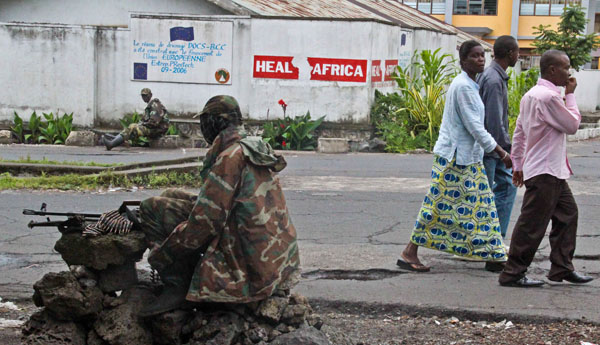
Despite failing to see eye-to-eye on a range of issues up for discussion in the Kampala peace talks, the Congolese government and the M23 rebels moved ahead over the weekend with a review of the March 23, 2009 agreement that is officially at the crux of the movement’s rebellion. The Saturday session, which lasted well into the night, left both sides satisfied, according to Thomas Muiti, North Kivu civil society president.
Questions remain about the legality of any deal struck outside the Congolese parliament, particularly with a group deemed a “negative force” which is claiming implementation of an agreement to which it was not a signatory. (The M23 as such never signed an agreement with the GoDRC; its mother movement, the CNDP, did.) However, influential delegate Edward Mwangachuchu, who is the chairman of the CNDP but, curiously, is taking part in the talks on the side of the Congolese government, told the Enough Project he urged both sides to continue to negotiate in good faith.
Last Wednesday, the M23 rebels and the Congolese government reached agreement on the agenda for negotiations to end the humanitarian and security crisis in the east after two weeks of preliminary talks. But even as political representatives of the rebel movement signed off on ground rules in Kampala, high-ranking military officers expressed concern about the trajectory of the talks and said the M23 delegation could pull out at any time.
Congolese civil society contacts in Kampala told the Enough Project that M23 views the Ugandan mediator as “being too close to the DRC delegation” given that Uganda President and ICGLR chairperson Yoweri Museveni and has reportedly warned that all of Congo’s problems cannot be dealt with in the Kampala talks alone and has therefore limited the M23 grievances on the table to nine issues, from their original 21. The mediator had notified the rebels’ delegation of that decision, which therefore stoked fears that in the event of a reintegration process, “it will be left to the Kinshasa government to decide which M23 members will be allowed back in the government institutions." That prospect is worrying in particular to the military commanders already targeted with international sanctions—men like Bosco Ntaganda and his acolytes Sultani Makenga, Baudouin Ngaruye, Innocent Zimurinda, and Innocent Kayina who have considerable sway over the political wing of the movement.
The rebels laid out plainly their position that general amnesty should be given for “acts of war and acts of insurrection.” They further called for the dissolution of all existing DRC institutions and the formation of a transitional government they called National Transitional Congolese Council, or CNTC, tasked with reviewing the Congolese constitution.
The DRC government delegation turned down the M23’s demand point blank. Abbey Appolinaire Malumalu, the delegation coordinator and spokesperson, said, “Kampala dialogue cannot deal with all questions under the authority of the [Congolese] constitution. M23’s litany of claims is a big joke that has nothing to do with the ongoing talks.” However, the agenda does include a discussion of amnesty.
On the ground in eastern Congo, both sides have been fortifying their military presence and making blustering speeches. Several reports by North Kivu civil society groups, local leaders, and eye witnesses have warned of new troop and weapon reinforcements on the rebels’ defensive lines near Goma in Munigi, Kibumba, and in the strategic town of Bunagana on the border with Uganda since mid-December 2012. “The M23 army is three times-fold now after its capture of Goma because all self-demobilized FARDC [soldiers] have joined the M23,” said Stanislas Baleke, one of the rebels’ spokesmen, to Radio France International last Wednesday. “On the other hand, M23 has more than 1,000 tons of ammunition and tanks that it’s ready to use against [DRC].”
The Congolese army, which is rumored to have received reinforcements from Zimbabwe, Angola, and Tanzania, has sent to Goma a sensitization mission to galvanize the government troops’ morale. They are preparing to be “ready to regain the last centimeter still under the control of the enemy,” said a senior officer who addressed an FARDC battalion at the military region HQ in Goma last week.
While international efforts to restore peace in the Great Lakes region—such as plans for deployment of the African neutral force and the use of surveillance drones to monitor security conditions—might have been expected to reassure Goma residents of concern for their plight, families are once again fleeing to other parts of Congo and to neighboring Burundi, Uganda, and Rwanda for safety. The increasingly tense rhetoric from both sides and the militarized environment leaves little doubt that the crisis isn’t over, for all the talk of negotiations and ceasefires.
Comments by the Rwandan foreign minister on BBC/Kinyarwanda last week further exacerbated concerns. Minister Louise Mushikiwabo threatened that Rwanda would enter eastern Congo conflict if drones were deployed without her country's consent as they would be seen as violating Rwanda’s territorial integrity. However, international pressure to address security may be factoring into a slight change of tone. In contrast to his cabinet members' statements, President Paul Kagame said to news reporters on Monday in Kigali that if the U.N. thinks drones will help achieve peace in eastern Congo then he has "no problem…if they think it can help."
Photo: M23 rebels outside of the Heal Africa hospital in Goma during the group's occupation of the city in November (AP)
Related Stories:

